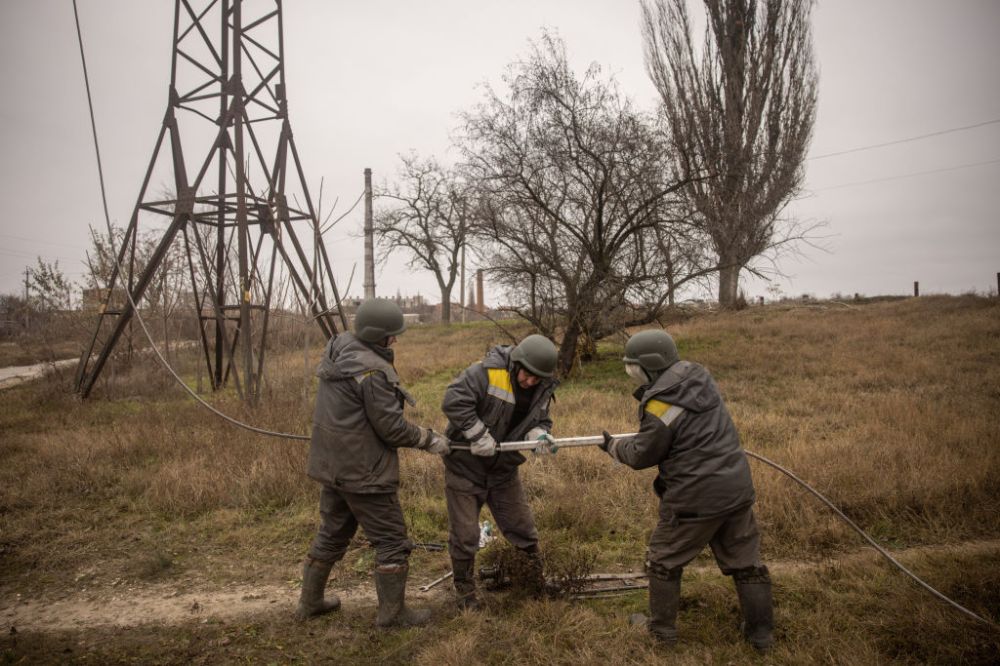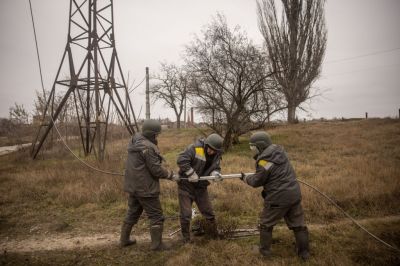This week, I briefed two dozen foreign policy and national security staffers in the Senate on the latest in Ukraine. I thought I’d share a few highlights.
To begin, I was invited and hosted by the chamber’s Republican Policy Committee (RPC)—a committee currently headed by Sen. Roy Blunt of Missouri and soon to be chaired by Sen. Joni Ernst of Iowa. Established in 1947, the RPC acts as a kind of internal “think tank” for Senate Republicans. Committee staff assist their caucus by researching and making recommendations on issues, legislation, floor debates, and votes.
One of the RPC’s longest-standing traditions is a weekly policy lunch for senators to discuss topics of interest and impending legislation. It also convenes briefings for Senate personnel where they can hear from outside experts, which is how I ended up on the Hill this week.
I was joined by two other experts, but because we were under Chatham House Rule, I won’t identify them here—but both were excellent. These two quickly got the room up to date on the latest battlefield developments and explained why American support to Ukraine is likely to be necessary for years. Then it was my turn.
I began by explaining how Russia is expanding its cyber operations as it endures mounting battlefield losses. Over the last several weeks, hackers in Putin’s military have increased attacks on Ukraine’s critical infrastructure—sometimes with isolated cyber-attacks and other times in conjunction with kinetic operations against these facilities. These operatives, sometimes known as IRIDIUM or Sandworm, have recently been using a particularly nasty wiper ware attack on dozens of targets in the energy, transportation, law enforcement, emergency services, and health care sectors. When unsuspecting victims download IRIDIUM’s “prestige” wiper ware, entire networks are taken over and their data permanently corrupted or lost, bringing most or all operations at the target facility to a standstill.
But, perhaps more significantly, Russia is expanding these operations into Poland. Railway and logistics targets in the NATO ally are being hit with similar wiper ware attacks, presumably to disrupt foreign military and other aid flowing into Ukraine. While the tactical rationale for these attacks is obvious, it could prove to be a strategic mistake for Moscow.
In 2017, Russian cyber attackers unleashed the “NotPetya” wiper ware attack in Ukraine, causing massive disruptions across the country’s electricity grid and other critical infrastructure. But it soon grew out of control, spreading across the world and causing more than $10 billion in damage across dozens of economic sectors. If “prestige” or another piece of malicious code were to break out and do similar damage, it could be considered an attack on NATO and potentially trigger treaty obligations. Putin is already tap dancing on a landmine and expanding cyberattacks to Poland could prove to be a deadly misstep.
I also explained that Russian cyber personnel continue to generate and promote false or misleading narratives throughout the West. Key narratives include sowing frustration across Europe over energy shortages and rising costs, criticism of so-called “blank checks” being written to the “corrupt regime in Kyiv,” and calls for Western governments to focus on “domestic renewal” rather than “endless wars overseas.” While none of these narratives have their origin in Russian propaganda, they are nevertheless being spread and promoted by Russian propagandists and used to erode political will and support.
For example, many of us have looked on in confusion as Germany routinely makes grandiose promises of military and economic aid to Ukraine, while continually falling short on delivery. Perhaps some of this confusion is explained by the fact that, according to Microsoft’s Russian Propaganda Index (RPI), Germans are consuming Russian propaganda at three times the rate of the Western European average. If politics is downstream from culture, and it is, then it’s no wonder that Berlin is having a hard time executing a coherent policy when its own people are being shaped by the enemy.
But a gap between the government and its people is not unique to Germany or even to Europe; the United States has its own challenges in this regard, and this was a topic of much discussion during the briefing. Several staff members agreed that helping Ukraine serves the U.S. national interest, but said it isn’t always easy explaining this to constituents. “For example,” said one person, “what do I say to those who are frustrated about how our European partners aren’t pulling their weight? Why aren’t they doing more in terms of money and weapons?”
A perfectly reasonable question; here’s my answer: As my friend Luke Coffey at the Hudson Institute explains, while the United States leads in total financial contributions, Latvia, Estonia, Poland, Lithuania, Norway, Slovakia, and Czechia have given more than we have as a percentage of GDP. In fact, if you add up all aid from European Union countries and institutions, they exceed that which is being provided by the United States. Of course, European countries can and should do more, but it’s not true to say they're doing nothing or even that they’re not doing a lot. But even if allies aren’t pulling their weight, the United States cannot sacrifice its own national security interests while it waits for Europe to get its act together. Balanced burden sharing is why the United States consistently pushes its allies and partners to invest in their militaries and other elements of national power, and we should keep doing this. But we can’t push “pause” on the war in Ukraine while we wait for everyone else to catch up.
Another thoughtful participant asked something along the lines of, “How do I convince people back home that we need to stick with this, when they’re sick and tired of these ‘forever wars,’ and would rather focus on the problems here at home?” Again, a reasonable question. Again, here’s my answer.
First, it’s entirely reasonable to be war weary. Since 9/11, it feels like we’ve been in one major conflict after another, and they haven’t gone as well as they should have. But it’s also important to remember that Ukraine is not a “forever war.” We have no boots on the ground and it’s the brave Ukrainians who are fighting and dying for their homes and for their freedoms. In fact, the United States cannot win this war for Ukraine, but we can certainly lose it for them by denying them the weapons and resources needed to punish and push back the Russian invasion.
Second, I totally get it when people look at the costs and other difficulties that come with supporting Ukraine, and when they get frustrated by the idea of having to deal with this for a decade or more. But foreign policy and national security are a game where the enemy chooses its own plays, and we're forced to respond. It sucks, but it'd be even worse if we simply abandoned the field.
We need to help our fellow Americans understand that there is no scenario in the near term where there isn’t a fire burning in the middle of Europe, threatening our nation’s interests. Even if we pulled all support from Ukraine and completely walked away from the conflict, the fight would go on, but we would have even less influence over its conduct and outcome—making the risk of miscalculation and escalation even greater.
Or maybe Russia would bounce back, viciously crush Ukraine, and conclude that wars of conquest are an effective foreign policy as it greedily eyes potential prizes in the Balkans and elsewhere. What then? At some point the United States will inevitably be forced to confront Putin and then we’re back where we started, only this time, with Americans fighting and dying.
This is why it was so important to deter Putin from invading in the first place, because once his tanks crossed Ukraine’s borders, our own policy options were narrowed, and the only remaining options were difficult and costly. But Ukraine is fighting and arguably winning! In fact, we can constrain one of our chief geopolitical opponents for years if we can keep the support and the ammunition flowing. Which brings me to the last point I made in the briefing.
American support to Ukraine is surfacing our very serious need for investment in our defense industrial base, and this is critical for our ability to confront China. Consider the following assessment by my AEI colleague, Mackenzie Eaglen:
Fleets of ships, aircraft, vehicles, and other equipment are reaching the end of their service lives, hitting the edge of their upgrade limits, and losing combat relevance. As great-power competition accelerates, the United States is offering a free and open window of opportunity and advantage to its adversaries. Unless policymakers take concrete steps now, defense leaders will continue America’s sleepwalk into strategic insolvency and its consequences. The aptly named “Terrible 20s” have arrived.
At this point, we’re feeling these shortfalls most acutely when it comes to basic armaments like missiles, rockets, and artillery shells. For example, before the Russian invasion, American weapons makers produced about 30,000 155mm howitzer rounds a year. Ukraine now goes through that amount roughly every two weeks. We’re realizing that, if the United States is going to be the “arsenal of democracy,” we need to have a defense industrial base capable of building and sustaining that arsenal. And we’re thankfully moving in the right direction.
Congress is set to pass a new military budget that includes, among other things, $2.7 billion for “additional munitions production and capacity expansion,” $5.9 billion for navy munitions, and directs an assessment of “the ability of the defense industrial production base to meet steady-state and surge requirements for propellants and explosives.” Specifically, the Pentagon is about to be given permission to award multiyear contracts for 864,000 155mm rounds, 106,000 GMLRS rounds, 12,000 Excalibur rounds, 12,000 JAGM missiles, 1,700 ATACMS missiles, and 700 HIMARS. In short: We understand our industrial base needs to grow and we’re starting to contract and spend accordingly (though we could use even more).
While many of us would say this realization is occurring way too late, it is still welcome. Not just because it will enable us to help Ukraine in its war against Russia, but because it sets the conditions for the United States to stay in the fight with China if that day ever comes. While we’re a long way from where we need to be, we should celebrate progress and take the wins where we can get them.
I always appreciate the opportunity to meet with policymakers and their staff. I don’t begrudge them when they ask probing questions or when they represent the concerns of their constituents—that's their job. If I can’t give good answers, then they have every right to be skeptical. But I trust they found my assessments helpful, and I hope you do too.
That’s it for this edition of The Current. Be sure to comment on this post and to share this newsletter with your family, friends, and followers. You can also follow me on Twitter (@KlonKitchen). Thanks for taking the time and I’ll see you next week!






Please note that we at The Dispatch hold ourselves, our work, and our commenters to a higher standard than other places on the internet. We welcome comments that foster genuine debate or discussion—including comments critical of us or our work—but responses that include ad hominem attacks on fellow Dispatch members or are intended to stoke fear and anger may be moderated.
With your membership, you only have the ability to comment on The Morning Dispatch articles. Consider upgrading to join the conversation everywhere.